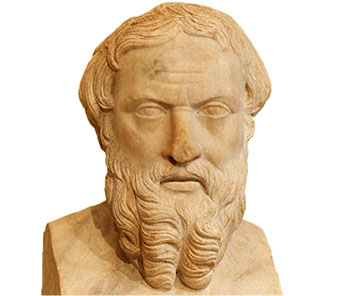WHAT IS HISTORY?
The word HISTORY derives from the Greek term "istoria", which means interview, interrogation of an eyewitness, and also refers to the results of these actions.
We also find in the Greeks the word "histor", which is translated as judge, person who knows, and the word "historeo", which means to search, search, examine.
The word after Greek, passed to other languages, especially through Latin.
History as a science, was born in Greece, in the 5th century BC, a culture that comprised a geographical area greater than the present one, from the south of the Balkan Peninsula, islands of the Aegean Sea, and coasts of Asia Minor. Therefore, the Greeks absorbed influences from other cultures and clashed with other civilizations.
 |
Herodotus (484-425 BC)
|
History arises as a need to explore and discover the nature of the cosmos and the known world, peoples and men.
Therefore, it is in Greece where it is born as an activity deeply linked to the interest in Humankind.
Herodotus, a Greek, originally from Ionia, the cradle of Greek science in the 6th century BC, is almost unanimously considered the "father of History", a history conceived as a collective memory, as an effort to not forget.
History is a social science: that is, it does not invent situations or characters, but is responsible for understanding and describing the characteristics of the relations between men and women of a given society and time. In order to understand the past, we have to know what happens in the present, which will help us to understand the past since the protagonists are always human beings.
As for space, it is not the same if the same event happens in one place or another. Time refers to the past, but this may be more or less remote.
To locate events and to differentiate between periods, historians divide the History of Humanity at different times.
Two great periods can be distinguished in the evolution of Man: History, when we already have written documentation to know the past of the different civilizations, approximately since the IV millennium BC, and Prehistory, which, as the word says, is the period prior to history, therefore we do not have written documents because the writing had not been invented.
The great times in which the History of Humanity is traditionally divided are 5:
-Prehistory, from the origin of Man to the invention of writing.
-Ancient History, from the invention of writing (4000 BC) until the fall of the Western Roman Empire (476 AD)
-Middle Ages, from 476 AD, until the fall of the Eastern Roman Empire, or also since the discovery of America (15th century)
-Modern History, from the discovery of America, until the beginning of the French Revolution (1789 AD)
-Contemporary Era, named after the nineteenth century, to locate events from 1789 to the present.
Comentarios
Publicar un comentario